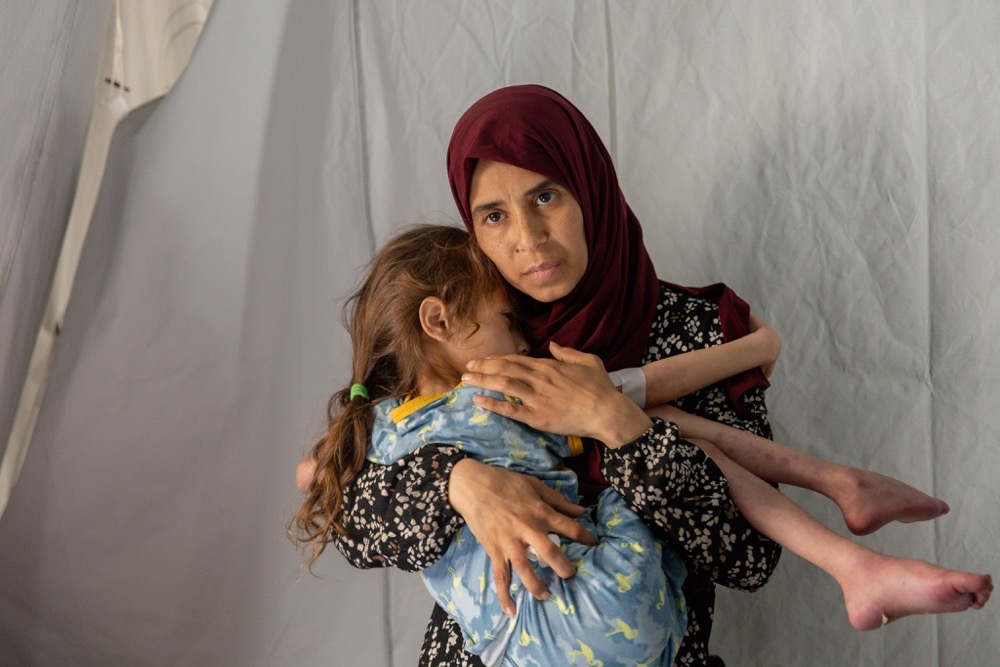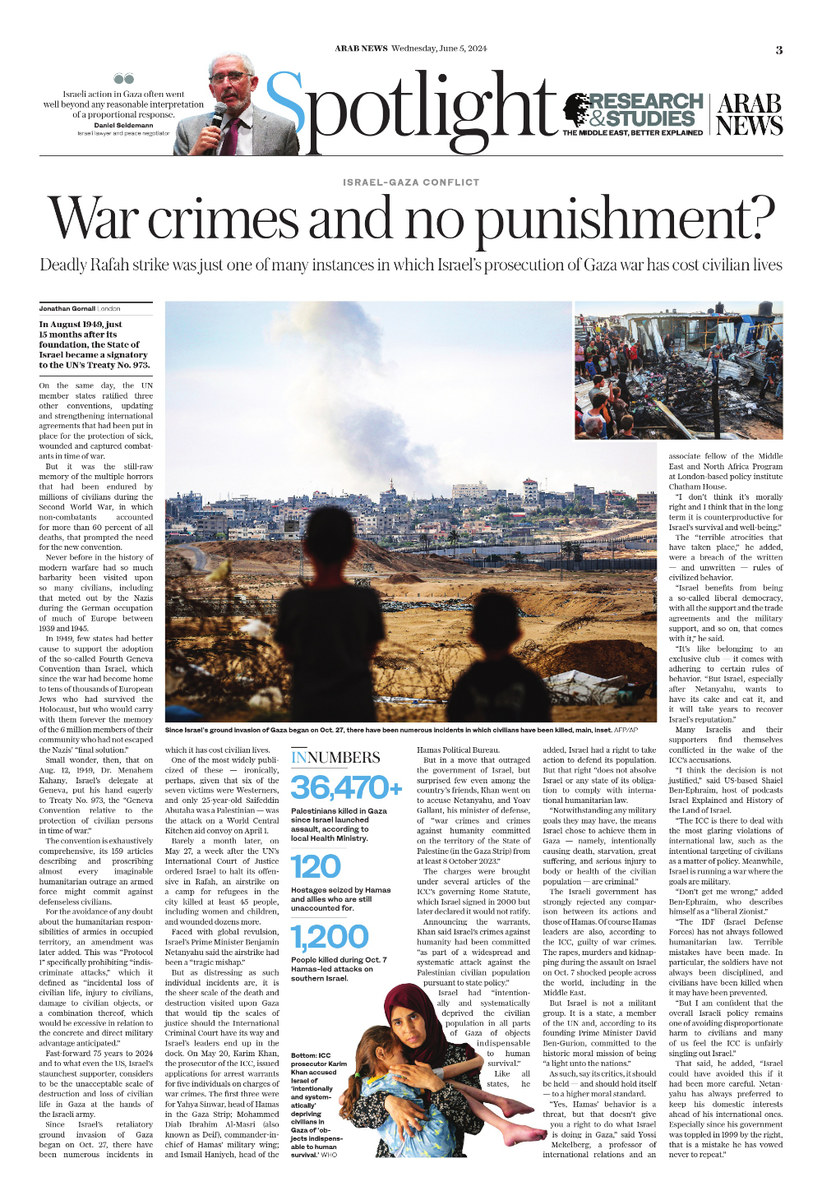LONDON: In August 1949, just 15 months after its foundation, the State of Israel became a signatory to the UN’s Treaty No. 973.
On the same day, the UN member states ratified three other conventions, updating and strengthening international agreements that had been put in place for the protection of sick, wounded and captured combatants in time of war.
But it was the still-raw memory of the multiple horrors that had been endured by millions of civilians during the long years of the Second World War, in which non-combatants accounted for more than 60 percent of all deaths, that prompted the need for the new convention.
Never before in the history of modern warfare had so much barbarity been visited upon so many civilians, including that meted out by the Nazis during the German occupation of much of Europe between 1939 and 1945.

A Palestinian girl who received treatment at a WHO-supported stabilization centre after being diagnosed with severe acute malnutrition and dehydration. (WHO)
In 1949, few states had better cause to support the adoption of the so-called Fourth Geneva Convention than Israel, which since the war had become home to tens of thousands of European Jews who had survived the Holocaust, but who would carry with them forever the memory of the 6 million members of their community who had not escaped the Nazis’ “final solution.”
Small wonder, then, that on Aug. 12, 1949, Dr. Menahem Kahany, Israel’s delegate at Geneva, put his hand eagerly to Treaty No. 973, the “Geneva Convention relative to the protection of civilian persons in time of war.”
The convention is exhaustively comprehensive, its 159 articles describing and proscribing almost every imaginable humanitarian outrage an armed force might commit against defenseless civilians.
For the avoidance of any doubt about the humanitarian responsibilities of armies in occupied territory, an amendment was later added. This was “Protocol 1” specifically prohibiting “indiscriminate attacks,” which it defined as “incidental loss of civilian life, injury to civilians, damage to civilian objects, or a combination thereof, which would be excessive in relation to the concrete and direct military advantage anticipated.”
Fast-forward 75 years to 2024 and to what even the US, Israel’s staunchest supporter, considers to be the unacceptable scale of destruction and loss of civilian life in Gaza at the hands of the Israeli army.
Since Israel’s retaliatory ground invasion of Gaza began on Oct. 27, there have been numerous incidents in which its heavy-handed warmongering has cost civilian lives.
One of the most widely publicized of these — ironically, perhaps, given that six of the seven victims were Westerners, and only 25-year-old Saifeddin Abutaha was a Palestinian — was the attack on a World Central Kitchen aid convoy on April 1.

Never before in the history of modern warfare had so much barbarity been visited upon so many civilians. (AFP)
The Israeli army, aware that the eyes of the world were on it, carried out a hasty internal inquiry. Its report concluded that its drone team responsible had mistaken a bag for a gun, but managed also to include some victim-blaming, claiming the vehicles’ large rooftop markings were not visible at night.
The army admitted the attack was a “grave accident” and sacked a colonel and a major it deemed responsible.
Barely a month later, on May 27, a week after the UN’s International Court of Justice ordered Israel to halt its offensive in Rafah, an airstrike on a camp for refugees in the city set fire to tents and killed at least 45 people, including women and children, and wounded dozens more.
Faced with global revulsion, Israel’s Prime Minister Benjamin Netanyahu said that the airstrike had been a “tragic mishap.”
But as distressing as such individual incidents are, it is the sheer scale of the death and destruction visited upon Gaza and its civilians that would tip the scales of justice should the International Criminal Court have its way and Israel’s leaders end up in the dock in The Hague.
According to the latest figures from the Palestinian Ministry of Health — issued on Sunday, June 2 — since Oct. 7 more than 36,000 Palestinians, including over 15,000 children, have been killed in Gaza. More than 10,000 are missing, presumed buried under rubble, and more than 80,000 have been wounded.
Even if the war stopped tomorrow, Israel’s systematic campaign of destruction has left Gaza mostly in ruins, with more than half its homes, over 200 mosques and most of its schools and hospitals damaged or destroyed.

Israel attacked a World Central Kitchen aid convoy on April 1, killing seven. (AFP)
On May 20, Karim Khan, the prosecutor of the ICC, issued applications for arrest warrants for five individuals on charges of war crimes. The first three were for Yahya Sinwar, head of Hamas in the Gaza Strip; Mohammed Diab Ibrahim Al-Masri (also known as Deif), commander-in-chief of Hamas’ military wing; and Ismail Haniyeh, head of the Hamas Political Bureau.
But in a move that outraged the government of Israel, but surprised few even among the country’s friends, Khan went on to accuse Netanyahu, and Yoav Gallant, his minister of defense, of “war crimes and crimes against humanity committed on the territory of the State of Palestine (in the Gaza Strip) from at least 8 October 2023.”
The charges were brought under several articles of the ICC’s governing Rome Statute, which Israel signed in 2000 but later declared it would not ratify.
Opinion
This section contains relevant reference points, placed in (Opinion field)
Announcing the warrants and revealing the vast amount of evidence the court’s investigators had accrued, Khan said Israel’s crimes against humanity had been committed “as part of a widespread and systematic attack against the Palestinian civilian population pursuant to state policy.”
Israel had “intentionally and systematically deprived the civilian population in all parts of Gaza of objects indispensable to human survival.”
Like all states, he added, Israel had a right to take action to defend its population. But that right “does not absolve Israel or any state of its obligation to comply with international humanitarian law.
“Notwithstanding any military goals they may have, the means Israel chose to achieve them in Gaza — namely, intentionally causing death, starvation, great suffering, and serious injury to body or health of the civilian population — are criminal.”

The World Central Kitchen workers who were killed by Israeli airstrikes. (AFP)
The Israeli government has strongly rejected any comparison between its actions and those of Hamas.
Of course Hamas leaders are also, according to the ICC, guilty of war crimes. The rapes, murders and kidnapping during the assault on Israel on Oct. 7 shocked right-thinking people across the world, including in the Middle East.
But Israel is not a militant group. It is a state, a member of the UN and, according to its founding Prime Minister David Ben-Gurion, committed to the historic moral mission of being “a light unto the nations.”
As such, say its critics, it should be held — and should hold itself — to a higher moral standard.
“Yes, Hamas’ behavior is a threat, but that doesn’t give you a right to do what Israel is doing in Gaza,” said Yossi Mekelberg, a professor of international relations and an associate fellow of the Middle East and North Africa Program at London-based policy institute Chatham House.
INNUMBERS
• 36,470+ Palestinians killed in Gaza since Israel launched assault, according to local health ministry.
• 120 Hostages seized by Hamas and allies who are still unaccounted for.
• 1,2000 People killed during Oct. 7 Hamas-led attacks on southern Israel.
“I don’t think it’s morally right and I think that in the long term it is counterproductive for Israel’s survival and well-being.”
The “terrible atrocities that have taken place,” he added, were a breach of the written — and unwritten — rules of civilized behavior.
“Israel benefits from being a so-called liberal democracy, with all the support and the trade agreements and the military support, and so on, that comes with it,” he said.
“It's like belonging to an exclusive club — it comes with adhering to certain rules of behavior.
“But Israel, especially after Netanyahu, wants to have its cake and eat it, and it will take years to recover Israel’s reputation.”

“Forewarned repeatedly, the prime minister (Benjamin Netanyahu) and the defense minister (Yoav Gallant) should be held accountable under international law,” said Daniel Seidemann, an Israeli lawyer. (AFP)
Many Israelis and their supporters find themselves conflicted in the wake of the ICC’s accusations.
“I think the decision is not justified,” said US-based Shaiel Ben-Ephraim, the host of podcasts Israel Explained and History of the Land of Israel.
“The ICC is there to deal with the most glaring violations of international law, such as the intentional targeting of civilians as a matter of policy. Meanwhile, Israel is running a war where the goals are military.
“Don’t get me wrong,” added Ben-Ephraim, who describes himself as a “liberal Zionist.”
“The IDF (Israel Defense Forces) has not always followed humanitarian law. Terrible mistakes have been made. In particular, the soldiers have not always been disciplined, and civilians have been killed when it may have been prevented.
“But I am confident that the overall Israeli policy remains one of avoiding disproportionate harm to civilians and many of us feel the ICC is unfairly singling out Israel.”
That said, he added, “Israel could have avoided this if it had been more careful. Netanyahu has always preferred to keep his domestic interests ahead of his international ones. Especially since his government was toppled in 1999 by the right, that is a mistake he has vowed never to repeat.

Since Israel’s retaliatory ground invasion of Gaza began on Oct. 27, there have been numerous incidents in which its heavy-handed warmongering has cost civilian lives. (AFP)
“But he has neglected foreign interests far too much in this war and is now paying the price for it. Indeed, he is said to be completely obsessed with these warrants and wishes he had done more to prevent them.”
Daniel Seidemann, an Israeli lawyer and peace negotiator whose nongovernmental organization, Terrestrial Jerusalem, works to highlight illegal Jewish settlement activities in East Jerusalem, believes Israel “was well … within its rights to respond militarily to Oct. 7, and there can be no military action without inevitable civilian casualties.”
But “Israeli action in Gaza often went well beyond any reasonable interpretation of a proportional response. Forewarned repeatedly, the prime minister and the defense minister should be held accountable under international law.”





























